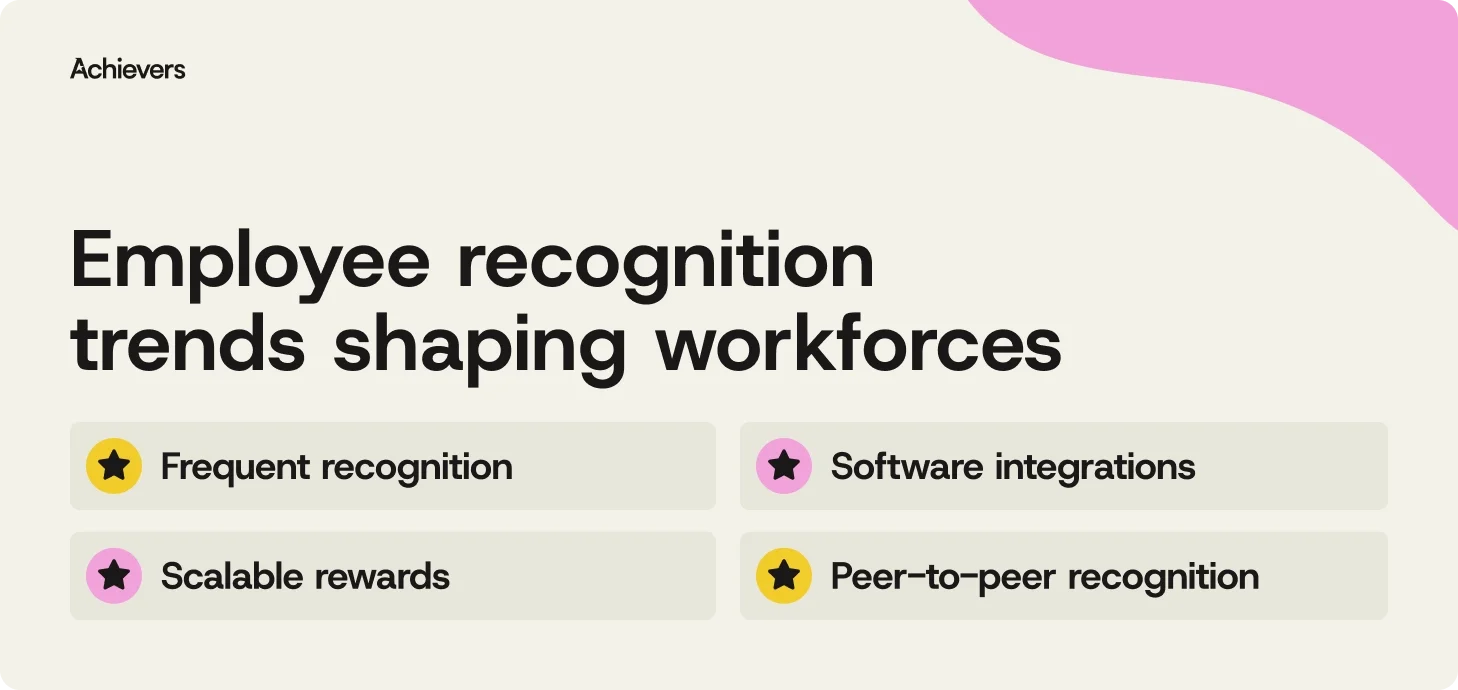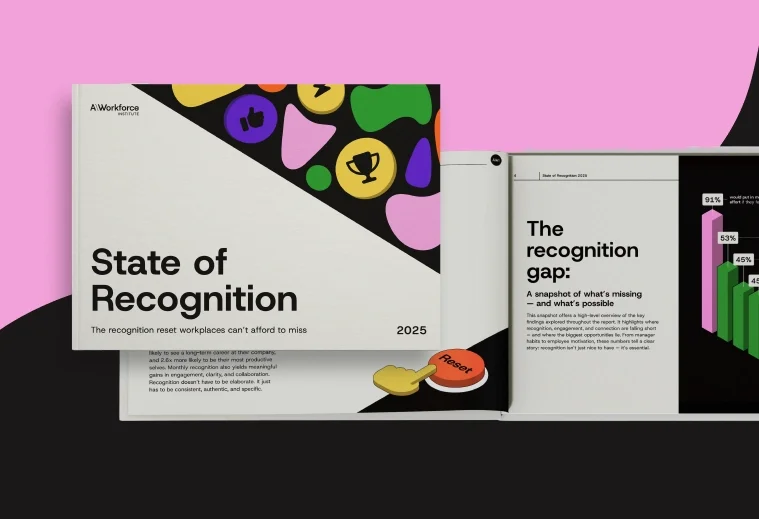Table of contents
Create a culture that means business™
Schedule a demo with an Achievers solution expert today.
Today’s employee recognition trends are making one thing clear: people want more than a paycheck and the occasional thanks. They want to be seen — regularly, specifically, and in ways that actually reflect the impact they’re making.
But most aren’t. Research from the 2025 State of Employee Recognition Report shows that only 19% of employees say they’re recognized weekly. And when recognition fades, so does everything else — engagement, trust, and the desire to stay. The good news? Employees who receive meaningful weekly recognition are 9x more likely to feel a strong sense of belonging, and more than twice as likely to be performing at their best.
Recognition, when it’s done right, is how leading organizations strengthen culture, reinforce what matters, and drive results from the inside out.
Here’s what’s shifting in 2026 — and how to turn the latest employee recognition trends into action.
1. Frequent employee recognition
Annual reviews aren’t the moment of impact they used to be — and employees aren’t waiting around for praise. In 2026, regular recognition is the expectation, not the exception.
But it’s not just about the big wins. More companies are leaning into micro-recognition — celebrating everyday contributions, quick wins, and progress in real time. These smaller moments add up, reinforcing a culture where appreciation is always on.
And the data backs it up: employees who are recognized monthly or more report 2x the engagement and productivity compared to those recognized just a few times a year.
The best part? Frequent recognition doesn’t have to be complicated. Organizations are:
- Adding shoutouts to weekly team meetings
- Encouraging quick recognition through Slack, Teams, or email
- Building habits with manager prompts and mobile-friendly tools
2. Personal and purposeful recognition
A vague “great job” doesn’t land the way it used to. Employees want to know what they did well and why it mattered. Specific, thoughtful recognition reinforces the behaviors you want more of and makes it more likely they’ll happen again.
To build the habit of meaningful recognition:
- Train managers to tie praise to company core values, team goals, or outcomes
- Share examples of strong recognition moments
- Encourage a “what, why, impact” approach in every shoutout
3. Integrating recognition into tech stacks
One of the biggest shifts? Recognition isn’t living off to the side anymore. It’s happening in the apps people already use — no extra clicks or logins required.
- When recognition is baked into the workflow, it becomes second nature. Leading companies are:
- Integrating recognition into tools like Microsoft Teams, Slack, and Workday
- Offering one-click mobile access to recognize on the go
- Making recognition feel less like a task and more like part of the culture
4. Offering scalable, personalized rewards
A branded mug might work for some. For others, it ends up in the back of a drawer. In 2026, rewards are personal — and that’s the point.
- When employees choose how they’re rewarded, the moment carries more meaning. Leading platforms are:
- Offering global marketplaces with millions of options (company swag is just the beginning)
- Supporting local and lifestyle-friendly redemptions
- Giving employees the freedom to choose — whether it’s a gift card, experience, or donation
Personalized rewards also help support remote and global teams — giving employees the flexibility to choose what’s meaningful, no matter where they’re working.
5. Adopting an accessible employee recognition platform
If recognition only works for your office workers, it doesn’t work at all. Modern programs are built for everyone — across devices, locations, and languages.
That means:
- Mobile-first platforms that reach every worker, wherever they are
- Multilingual interfaces to support global teams
- Dashboards and reporting that track reach, usage, and impact
When recognition is truly accessible, it supports everyone — including the frontline and deskless workers who often get left out of traditional programs.
6. Peer-to-peer recognition
It’s not all on managers anymore — and that’s a good thing. Peer recognition builds connection, boosts morale, and reinforces shared values across teams.
Employees who receive monthly recognition from their peers are 2x more likely to feel a sense of belonging and trust at work.
To build a culture of peer-powered appreciation:
- Open up recognition access to every employee
- Encourage team-based shoutouts and wins
- Spotlight peer moments publicly to build momentum
7. Promoting the company’s employee recognition program
Even the best recognition program needs a little spotlight. If employees don’t know where to find it, or why it matters, engagement suffers.
The fix? Treat your program like an internal campaign. According to Achievers Workforce Institute (AWI), recognition frequency correlates directly with performance, retention, and belonging — but only when employees actually use the platform.
The most effective companies:
- Share regular updates on recognition trends, program milestones, and impact
- Spotlight recognition moments publicly — in town halls, newsletters, and on a digital platform
- Run challenges or campaigns that drive participation (think “most recognitions this month”)
- Equip leaders with talking points and templates so they can lead by example
- Recognize efforts around wellness, mental health, and work-life balance — showing employees that care is part of the culture
Because when recognition is visible, it’s more likely to be repeated. And when leadership models the behavior, others follow.
8. Using recognition data to drive decisions
Recognition isn’t just a feel‑good metric — it’s a business lever. Leading organizations track recognition frequency and sources (manager vs peer), compare trends across demographics and teams, and share insights with leaders to inform talent strategies. In fact, according to AWI’s 2026 Engagement and Retention Report, employees who feel appreciated are 17x more likely to see a long-term career at their company — making recognition data essential for engagement and retention efforts.
To make data actionable:
- Track recognition frequency and sources (manager vs. peer)
- Compare trends across departments, demographics, and time periods
- Share insights with leaders to inform culture and talent strategies

The platform built for today’s employee recognition trends
These trends aren’t just passing ideas — they reflect how recognition is actually evolving in the workplace. And putting them into practice takes more than good intentions. It takes the right tools.
Achievers is built for exactly that. Every part of the platform is designed to support what today’s employees expect — frequent recognition, meaningful rewards, and experiences that feel personal, not transactional.
With Achievers, you get:
- Seamless integrations with tools like Workday, Teams, and Slack, so recognition fits into the flow of work
- Manager nudges and built-in campaigns that help make appreciation a habit
- A global rewards marketplace with millions of options, so everyone finds something that matters to them
- Real-time insights to track what’s landing — and where to level up
It’s recognition that connects people to purpose and helps shape the culture you’re working toward — one moment of appreciation at a time.
Bring recognition trends to life — and make them last
The trends shaping employee recognition in 2026 aren’t about perks — they’re about creating workplaces where people feel seen, supported, and connected to something bigger. When recognition is consistent, personal, and easy to give, it drives more than just morale. It drives performance, trust, and long-term loyalty.
The good news? You don’t have to tackle it alone. Whether you’re just getting started or looking to level up your current program, Achievers gives you the tools, insights, and support to build a recognition culture that sticks.
Employee recognition trends FAQs
Key insights
- Employees expect frequent, meaningful recognition, with weekly praise driving higher engagement and belonging.
- Recognition works best when it’s specific, integrated into workflows, and personalized.
- Programs succeed when they’re inclusive, visible, and easy to access for everyone.




